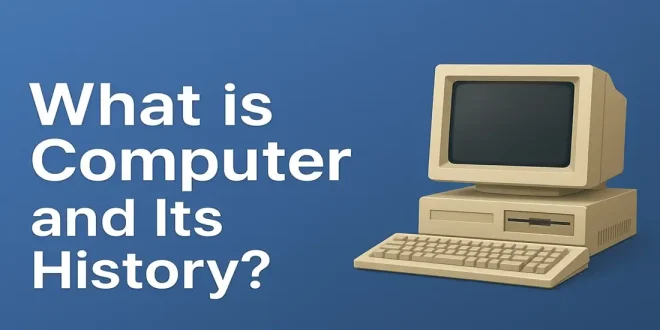What is Computer and Its History?
Computer and Its History is a more sophisticated equipment which stores and retrieves information faster than any human. Computers are used to aid in any complex calculations such as artificial intelligence. They have taken control over the learning and communication methods of the modern world. Computers are used by wide range of people. They do complex calculations.
The Electronic Device: A Computer
Computers are defined as machines which take input and then processes the data, stores the information and gives the output. The main Components of a Computer are;
- Manipulative instruments as a keyboard or a mouse.
- Central Processing Unit.
- Memory and store units.
- Output instruments such as a monitor or a printer.
Computers are operated by a code of a binary system consisting of 1s and 0s to do complex computing without making any errors.
The Early Days of Computers
The history of computers started thousands of years ago. The first tools used were mechanical.
The Abacus: The first computing tool used by early cultures to solve simple equations.
Napiers Bones: made by John Napier to aid in multiiplication and divison in 1617.
Pascaline (1642): Blaise Pascal’s mechanical calculator which could only do addition and subtraction.
Leibniz Wheel (1673): Advanced mechanical calculations further and was introduced by Gottfried Wilhelm Leibniz.
These inventions were the beginning in the field of computing technology.
Modern Computing Machines Were Born
There were significant improvements in mechanical computing in the 19th century
Babbage’s Analytical Engine (1837). Babbage is referred to as the “father of the computer” because of the Analytical Engine which he imagined as a machine with a mill (CPU) and a memory which could accept input through punch cards.
Ada Lovelace was considered the first programmer as she created algorithms for Babbage’s machine and had the foresight of it being more than a calculator.
While Babbage’s machine was never completed in his lifetime, it was a step toward the supporting structure for future programmable computers.
The First Generation of Computers (1940s – 1950s)
- Massive, power-hungry machines, the first true electronic computers, emerged in the periods during and right after World War II.
- `ENIAC` (1945) First general-purpose electronic computer that was created by John Presper Eckert and John Mauchly.
- The early computers EDVAC and UNIVAC introduced the idea of stored programs.
These first computers of a generation in which vacuum tubes were switches and immensely large in size, spaced out in numerous rooms.
Second Generation Computers (1950s–1960s)
Using transistors in place of vacuum tubes improved size, speed and reliability of computer systems.
- Decreased power usage.
- Enhanced speed in processing.
- Emerging programming languages such as FORTRAN and COBOL.
This was the first time computers could be used in business and government.
Third Generation Computers (1960s–1970s)
ICs and the ability to place many transistors on one silicion chip was the leap of technology for the third generation.
Operating systems for smoother control over computer resources.
When systems started time sharing and multi programming, computers became cheaper.
Computers were still expensive, but no longer limited to the government and big businesses.
Fourth Generation Computers (1970s–Present)
Intel’s microprocessor, the first of its kind, was a game changer for computers in 1971. Now a whole CPU could be packed in one chip.
- PCs became available the public for the first time, thanks to Apple, IBM, and Microsoft.
- More easier to use compared to previous machines.
- Nanetworks and the Internet together revolutionized digital technology. They allowed fast and easy sharing of information.
This generation made computers a huge part of everyday tasks.
Fifth Generation Computers and Artificial Intelligence (Present and Future)
- Fifth generation computers are designed for super machines, Artificial Intelligence, and advanced machine learning and quantom computers.
- Decision making systems- Voice Natural Processing Recognition and voice systems are so developed.
- Exremely fast quantum computers.
Fifth generation computers are designed for super machines, Artificial Intelligence, and advanced machine learning and quantom computers.
The Evolution of Computer Storage
The progress of computers and evolution of computer storage devices are for a long.
New computers have access to high speed data storage devices including.
Server storage, cloud storage, Solid State Drives (ssds), and other modern computer storage devices.
The evolution of storage stystems has drastically improved computers ability to manage high capacity and hyper speed data.
Impact of Computers on Society
Computers have transformed a great deal of areas in the life of a human.
Education- Remote learning has utilized the assisting of computers in every field available.
In the Healthcare Industry, surgical operations are carried out by robots, and computed tomography along with other methods have allowed the field to advance incredible.
In Business- computers facilitate automation methods, e-commerce, and execuation of finance.
In communication, social networks, emails, and systems of instant messaging have been erected and a new virtual world of Communication was born.
In Science and Research, computers facilitate advanced systems with high speed in simulations along data analyzing systems. The impact of computers is real and distinct on economies, cultures, and people’s daily activities.
Conclusion
In our case, the ancient abacus has evolved to artificial intelligence and quantum computing, and the transition has been fully persistent to innovation. Each new generation has been able to bring more optimized and quicker machines that work on thinking and aiding not just solving but analyzing complex world problems.
The history of computers is not robots and gadgets, it is the never-ending advancements people and computer technology has worked with. The computer is and will be the most important part of technology for any civilization to the innovations of the future.

